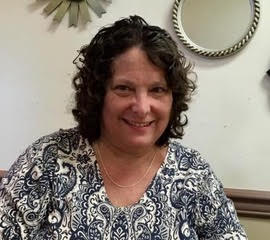First awarded in 2022, the NORDP Mentoring Award recognizes an individual NORDP member’s unique ability to provide an engaging, supportive, and inclusive environment for professional and/or personal growth through mentorship in the research development community. This award is bestowed with the acknowledgment that effective mentoring occurs through formal and informal channels and may vary in style and substance.

Who: Carolynn Julien
Where: Fairleigh Dickinson University
Number of years in research development: 34 years
Length of NORDP membership: 10 years
What does this mentoring award mean to you?
Let me just start by saying, I was surprised to get the award. I was totally thrown off. I was fidgeting with something and I heard my name being called. If there was anything that I would want to be recognized for, it would be mentoring. It is just the best honor ever! It solidifies who I am and my efforts. It was just perfect!
What has your mentoring journey within NORDP looked like?
I believe it was 2013 when I found out about the NORDP mentoring program, and I was matched with a wonderful mentor, Linda Mason from the University of Oklahoma. It was a wonderful experience. I even got a NORDP travel award to meet her in Austin. She was my introduction to NORDP, and it was just the most amazing connection that I had with her. She came up to where I live in New York once and we got to spend time together while she was on vacation. I recently found out that she passed away and I was just so heartbroken. Linda was amazing and really helped me to grow as a professional.
Generally, I think I remained on the outskirts of NORDP. I was kind of a lurker. I wasn’t fully engaged until I decided to join the mentoring committee. Serving on the committee solidified my commitment to NORDP and it was an opportunity for me to not only engage but to give back.
What initially drew you to mentoring?
I always say, “Mentoring is who I am and what I do.” I have mentored in so many capacities, professionally and personally. I am in an organization where I mentor high school girls. I have mentored people in a group that I created across the City University of New York, where I mentored many individuals across the RD spectrum. Mentoring was the focus of my dissertation. So, yes, it’s my “walk.”
How did you take the first step in the “walk” of mentoring?
My parents always taught me that I’m on this earth to give back. And that has always been a part of me. My upbringing taught me to give back and to figure out how I can give back. Mentoring allows me to have those personal relationships to give back.
What does being a good mentor mean to you?
It means that I show up fully and I provide a space where I will help a mentee grow both personally and professionally. It means that I will be a good listener and that I am looking to understand not only what is spoken but what is also unspoken. It means that I am going to be a cheerleader, and that I am going to be a friend; It means that I am going to be an educator; It means that I am going to be a student; It means that I’m going to be whatever the role is that my mentee needs. The mentee decides and I provide.
You have lived in the spirit of mentoring your entire life. Is there a lesson you have learned along the way that has helped you become a better mentor?
The lesson I have learned is that mentoring relationships have no finite timeline. I think that’s something I struggle with a little bit when it comes to the NORDP program because it’s a one-year commitment. I don’t believe that mentoring relationships have a timeline. The mentoring relationships that I have are ongoing. There are people who I worked with 20 years ago and if they need me, I will be there. They know how to find me and if it’s a year from now, 10 years from now, 20 years from now — I will be there.
What have you found most challenging about being a mentor?
I think one of the challenges in a mentoring relationship is creating intimacy. The best relationship investments are where both the mentor and the mentee can fully show up. That’s a challenge, but it’s a challenge that I love. Because I like taking the time to get to know the mentee, and it takes time. It takes care, patience, and a willingness to accept who this person is.
What advice do you have for others within NORDP who wish to follow in your footsteps?
I’m going to borrow from Nike…Just do it! It’s scary at first. I can remember when the camera came on for the first time and there was a person in another Zoom box. In my mind, I am saying to myself, “I had this mentor training and I should have the right thing to say.” But I have found the best success through listening to my heart. Your heart will guide you. You’ll know what to say and what to do. And it really starts with intention. If your intentions are to help an individual with the agreed upon goals, and you fully show up and listen, your intentions will guide you.

NORDP president Anne Maglia (left) presenting the 2023 Mentoring Award to recipient Carolynn Julien (right).



